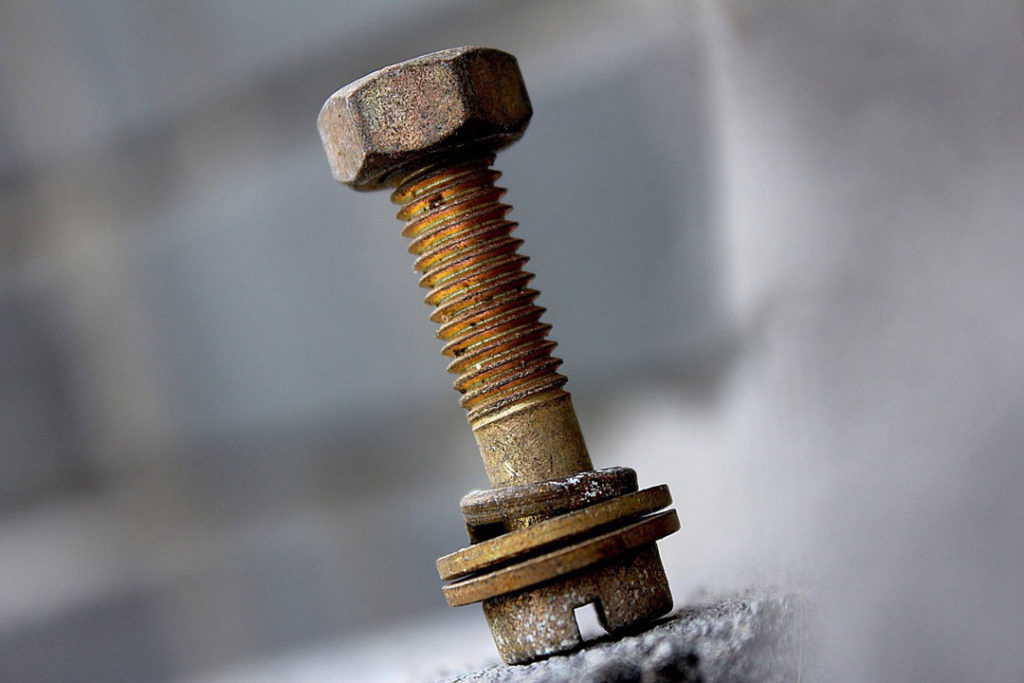If there is one thing that can truly damage the strength and integrity of metal fasteners, it is corrosion. At West Land Fasteners, we use the latest technology and information to prevent rust and corrosion so that our fasteners can stand the test of time.
Unfortunately, even when construction professionals use the best materials in their projects, corrosion can take place. So, it’s crucial to learn to prevent corrosion in most cases.
Let’s first start by learning how corrosion actually happens, as this knowledge will help you to keep your structure intact for many years to come.
How does corrosion take place?
Corrosion takes place when the metal starts to lose its inherent properties. All metals hold different types of electric potential. When water, which is an electrolyte, interacts with two different metals, it leads to the creation of a galvanic cell that initiates the flow of electric current between the metals. This flow of electrons from higher potential metal a.k.a. ‘anode’ to lower-potential metal a.k.a. ‘cathode’ gradually degrades the metal-containing higher electric potential, resulting in what we notice as corrosion or rust.
High-potential metal fasteners often get corroded when they are installed on low-potential metal, which is why it is crucial to take necessary precautions from corrosion in such installations.
Types of corrosion
There are different types of corrosions that impact metal fasteners. Construction professionals need to be aware of how corrosion will impact their fasteners so that necessary measures can be taken in advance.
One of the most common mistakes done by many is the usage of the same preventive measures on all installations. One cannot apply the same approach to prevent corrosion everywhere, because there are different types of corrosion and so different strategies are required for prevention.
To use the correct method, you should first inspect the type of corrosion that you are expecting. This can be done easily by learning about the different types of corrosion.
Here are some of the most common types of corrosion:
Uniform corrosion
Uniform corrosion is the most common type of corrosion that turns metal fasteners red. As the name suggests, this type of corrosion or rust is distributed uniformly throughout the length of the metal fasteners.
Uniform corrosion is highly destructive as it affects the entire metal and makes it extremely difficult to undo the fastener when needed.
Galvanic Corrosion
Galvanic corrosion is caused by the presence of moisture between the two metals. This moisture creates a reaction between these metals, which ends up damaging one or both the metals.
Many construction professionals use plastic washers while installing metal fasteners in order to prevent galvanic corrosion.
Crevice Corrosion
Crevice corrosion can take place due to the presence of moisture inside any cracks or crevices on your fasteners. The possibility of this type of corrosion increases with the number of joint faces present on the fasteners.
Crevice corrosion can be avoided by reducing the use of washers.
Stress corrosion cracking
Stress corrosion cracking happens when metal is under tension. This type of corrosion leads to cracking which ultimately damages the fastener.
To prevent this corrosion, it is recommended to perform periodic inspection of the critical metal bodies that are fastened together.
Ways to prevent corrosion
It is possible to prevent corrosion if you take necessary precautions before the installation. To begin, you should investigate the environment that the fasteners are going to be placed in. Find out if these fasteners will be exposed to any kind of moisture or water.
Once you know about the elements that the fasteners are going to be exposed to, you can take preventive measures from the beginning itself.
One of the best things to do will be to choose fasteners that have similar electric potential to the metal that they are installed upon. This will reduce the electrical flow between the two metals and thus reduce the rate of corrosion.
Another thing to be careful about during the installation would be the pressure. Constant changes in pressure or load can speed up the rate of corrosion. So, you need to ensure that the installed fasteners are delivering constant pressure on the metal bodies that are fastened together.
West Land Fasteners in Milwaukee, Wisconsin are an expert at preventing corrosion. We prevent rust on our fasteners by using insulation and dielectric coatings; especially when our fasteners are installed on a different metal. So, if you want your structures to remain intact for many years to come, talk to one of our professionals who will be more than happy to assist you.
